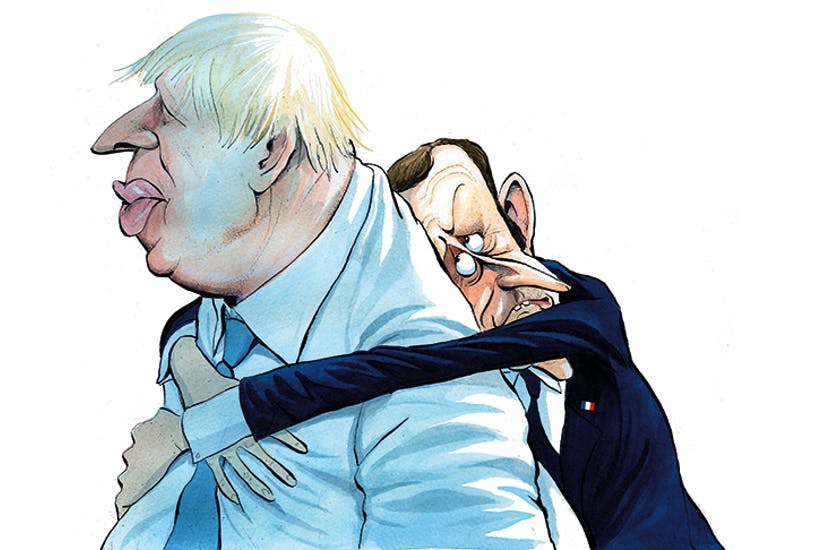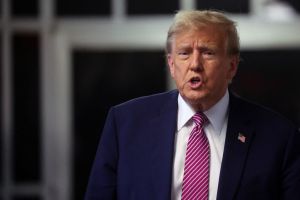This article is in The Spectator’s February 2020 US edition. Subscribe here.
Montpellier, France
As the new year dawned, it was business as usual in France, with transportation paralyzed, hundreds of cars burning in the suburbs, violent demonstrations in the cities, a whiff of tear gas in the Métro, police beating protesters. Train drivers, air-traffic controllers, nurses, garbage collectors, ballet dancers, opera singers were all on strike — and so, even, were lawyers. If the country is not wholly immobilized, it’s because the French are pretty adaptable and, to be honest, some only pretend to strike. My garbage was picked up in the normal way.
Making the French swallow bitter medicine is hard, even in a nation of hypochondriacs. But two and a half years ago, Emmanuel Macron, not yet 40 and the newly elected president of France, was pictured on the cover of the Economist walking on water. He was ‘Europe’s savior,’ declared the magazine, reflecting widespread sentiment. For bien-pensants everywhere, Macron’s contrast to President Trump was the clincher: brainy not impulsive, centrist not populist, cultured not vulgar, a product of meritocracy, not of inheritance or privilege.
He began his presidency hoping to deliver a ‘European renaissance’, but his attempts to deepen the EU have been met by hostility in Germany and beyond. He promised to unblock the French economy, but France continues to export capital and brains. He talks of civility, but there have been more than 60 consecutive weekends of street protests — many characterized by extraordinary levels of violence, including by the police. Only the most hardcore of his fans remain unshaken by this remarkably dismal performance. Unemployment is down, a bit, but it is still double that in Britain and Germany.
Macron is — or pretends to be — serene, the author of his own image: a bit like Donald Trump. Indeed, Trump is not the only one whipping up international diplomatic frenzies with incendiary populist provocations. That’s Macron cozying up to Putin; Macron ranting against brain-dead Nato and immigrants and Islamic terrorists; Macron Twittering like a noisy grackle. After boasting that he could manage Trump, Macron’s rapport with the president has collapsed, and America is preparing to impose 100 percent tariffs on French wine and cheese.
Not only that, but Macron’s plan to bring Iran in from the cold has been shot down, literally in flames. His effort to lead the world’s response to climate change has failed. His war against militant Islam in Africa is not being won, and threatens to be lost. He’s even arguing with Tokyo. The parastatal French carmaker Renault’s partnership with Nissan is in trouble, while its former leader, Carlos Ghosn, a French citizen, is a fugitive from Japanese justice.
Macron’s talent for losing friends and alienating people seems to know no limits. There was his spectacular performance in London in November when, at the celebrations of Nato’s 70th anniversary, he managed to feud simultaneously with Angela Merkel, Recep Erdogan and Donald Trump. Yet there was one leader who seemed to be getting on well with him — and that was Boris Johnson. Suddenly, intriguingly, incredibly, there is a new personality in this drama, perhaps a deus ex machina. Macron needs help and his new best friend, bizarrely, is Britain’s prime minister.
Here’s something overlooked, because it hasn’t been happening since Britain binned Theresa May last summer. Macron has stopped disrespecting les rosbifs — which he used to do publicly at every opportunity, often several times a week, as he traveled around France calling Brexit insane, nationalist and propelled by liars. (Who could he have had in mind?) All forgotten since falling under the spell of BoJo.
Emmanuel and Boris are the oddest couple in international diplomacy. Both are products of their nations’ elite education system. But after Oxford for Johnson and the École nationale d’administration for Macron, their trajectories could hardly have differed more.
Johnson was a brilliant, incendiary journalist, Macron a clever but anonymous technocrat. Boris entered politics with high ambitions, but a sense of fun. Macron stayed in the shadows, emerging seemingly from nowhere to seize the presidency from his gormless boss, François Hollande, having never previously been elected to anything. Boris improvises. Macron plans everything. Boris likes women — lots of them. Macron married his high-school drama teacher, 24 years his senior. Yet there is something going on between these two. The body language says they like each other. The video from the Nato reception at Buckingham Palace, at which they were literally shoulder to shoulder as they reveled in Justin Trudeau’s mockery of Trump, is telling. When Boris visited the Elysée, the French presidential palace, in August, Macron was photographed actually laughing as Boris stuck his feet on the designer furniture.
What might these two enfants terribles get up to? An especially curious geometry presents itself in a post-Brexit era, when little will be more important to the British than preserving civility with the French. A trade deal is obviously Topic A, since the absence of one could tip both the UK and Eurozone into recession. But there’s much more scope for these two leaders to work together. Britain is the only capable potential military ally France has got. France, engaged in a grinding conflict in Africa, needs help. France has gigantic stakes in British energy, transport and services. The City of London remains the dominant financial player in the EU, offering services vital to governments and businesses. And the Islamist security threat is common to both sides of the English Channel.
Moreover, there are at least 300,000 French residents in the UK, and a similar number of Britons in France. London’s South Kensington is practically the 21st arrondissement of Paris. The social and economic relationship is closer than it’s ever been. So, after publicly trashing the UK for more than two years, Paris has softened its tone. A president obsessed with symbols, Macron has proposed to award London the Légion d’honneur for its resistance during the war, and its (albeit icy) reception of General de Gaulle.
If Johnson can maintain his romance with Macron, it could be a cornerstone of European relations for years to come, benefiting them both. Johnson looks secure for five years, if not 10 — and even Macron, in his own reality bubble, must recognize this. It will not be long before France enters a new electoral cycle and, despite the comprehensive mess he has created so far, it would be foolish to bet against Macron.
At the Elysée he’s digging in for the long haul. Insiders say he’s made the place his own, more or less abandoning the ceremonial presidential office for a new hypermodern command center dominated by an enormous concrete desk created by star designer Francesco Passaniti, and installed recently with much sweating and groaning by the déménageurs. Le Figaro magazine ran a picture of him sitting at it, his fawning wife Brigitte at his shoulder. A source close to him told Figaro: ‘What’s fascinating, is that reality matters less to him than the story he can make of it.’ Eat your heart out, Donald Trump.
Macron’s polls haven’t moved much since the worst of the ‘gilets jaunes’ demonstrations (named for the yellow jackets worn by the populist protesters) were crushed by muscular policing. Though he has crawled off rock bottom, his numbers are still awful. Perhaps 5 percent support him enthusiastically; 20–25 percent reckon he’s better than the alternatives; 70 percent are unimpressed. Yet given the eccentric French two-round electoral system, that could be enough for re-election in 2022, especially if, as seems likely, he’s pitted in the second round against Marine Le Pen and her nativist, economically incoherent Rassemblement National party.
It is Macron’s luck that French voters who never warmed to him, and who on the whole like him less than ever, may still find him the lesser evil. The left and right are atomized, toxic and unelectable. The once-mighty socialists are invisible. The traditional right is on its knees. The media are obedient. He needs only 25 percent of the vote to get to the second round. If he faces Le Pen again, it’s probably match point for Macron.
Having Boris as his friend might humanize him in the eyes of French voters, who seem to rather admire the roguish new prime minister, so terriblement British. Perhaps Boris can teach Macron how to lighten up, give a pithy speech, even tell a joke. Macron still seems likely to preside over the Paris Olympics in 2024, and London 2012 was a triumph for Johnson as the city’s mayor. Maybe he could offer a few tips.
How does this bromance end? It won’t be known until the fat lady sings — and presently she’s on strike.
This article is in The Spectator’s February 2020 US edition. Subscribe here.



















